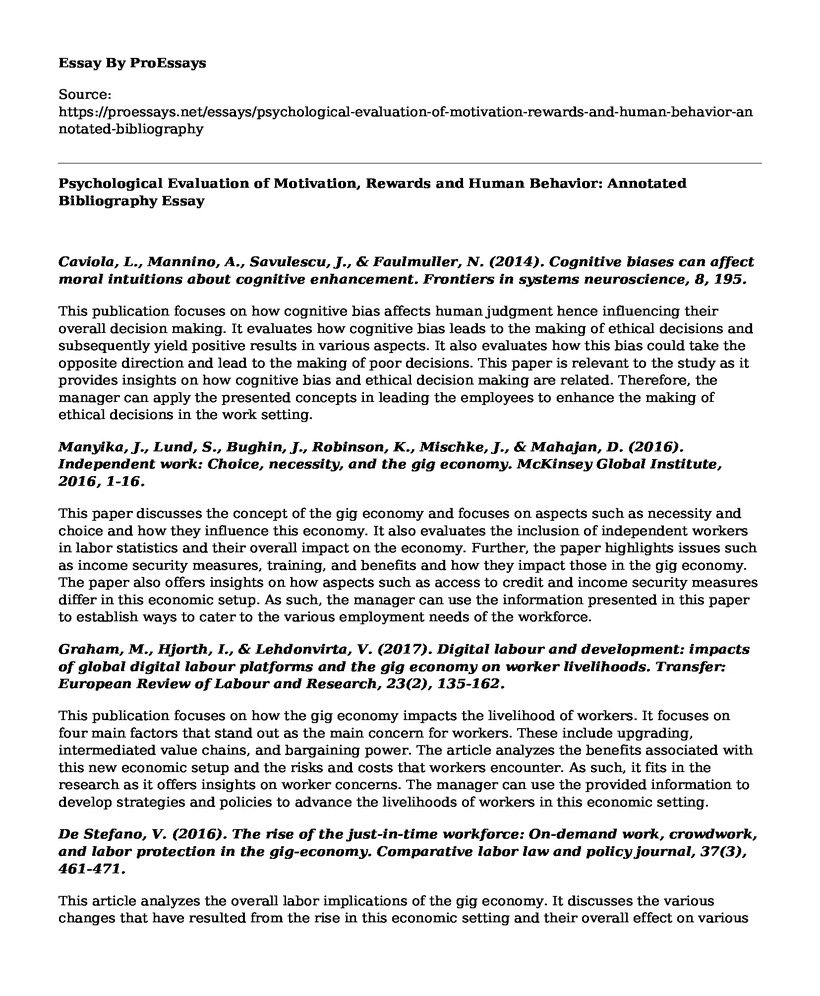Caviola, L., Mannino, A., Savulescu, J., & Faulmuller, N. (2014). Cognitive biases can affect moral intuitions about cognitive enhancement. Frontiers in systems neuroscience, 8, 195.
This publication focuses on how cognitive bias affects human judgment hence influencing their overall decision making. It evaluates how cognitive bias leads to the making of ethical decisions and subsequently yield positive results in various aspects. It also evaluates how this bias could take the opposite direction and lead to the making of poor decisions. This paper is relevant to the study as it provides insights on how cognitive bias and ethical decision making are related. Therefore, the manager can apply the presented concepts in leading the employees to enhance the making of ethical decisions in the work setting.
Manyika, J., Lund, S., Bughin, J., Robinson, K., Mischke, J., & Mahajan, D. (2016). Independent work: Choice, necessity, and the gig economy. McKinsey Global Institute, 2016, 1-16.
This paper discusses the concept of the gig economy and focuses on aspects such as necessity and choice and how they influence this economy. It also evaluates the inclusion of independent workers in labor statistics and their overall impact on the economy. Further, the paper highlights issues such as income security measures, training, and benefits and how they impact those in the gig economy. The paper also offers insights on how aspects such as access to credit and income security measures differ in this economic setup. As such, the manager can use the information presented in this paper to establish ways to cater to the various employment needs of the workforce.
Graham, M., Hjorth, I., & Lehdonvirta, V. (2017). Digital labour and development: impacts of global digital labour platforms and the gig economy on worker livelihoods. Transfer: European Review of Labour and Research, 23(2), 135-162.
This publication focuses on how the gig economy impacts the livelihood of workers. It focuses on four main factors that stand out as the main concern for workers. These include upgrading, intermediated value chains, and bargaining power. The article analyzes the benefits associated with this new economic setup and the risks and costs that workers encounter. As such, it fits in the research as it offers insights on worker concerns. The manager can use the provided information to develop strategies and policies to advance the livelihoods of workers in this economic setting.
De Stefano, V. (2016). The rise of the just-in-time workforce: On-demand work, crowdwork, and labor protection in the gig-economy. Comparative labor law and policy journal, 37(3), 461-471.
This article analyzes the overall labor implications of the gig economy. It discusses the various changes that have resulted from the rise in this economic setting and their overall effect on various industries. It also analyzes the interconnections that drive the economy and how they are transforming things. The article links to the research topic by providing insights on the changes that mark the shift from the traditional economy. It also analyzes labor protection concepts in the new economy. Subsequently, the manager can take note of these changes and plan strategies on how to adapt appropriately.
Healy, J., Nicholson, D., & Pekarek, A. (2017). Should we take the gig economy seriously?. Labour & industry: a journal of the social and economic relations of work, 27(3), 232-248.
This article focuses on the emergence of the gig economy and how it has challenged the traditional setup. It evaluates the resultant changes, particularly on the interactions between firms and customers. Further, it provides insights into the future of this economy, analyzing why firms should take this new concept seriously. As such, it presents a solid basis for the research paper as it highlights the various developments of this industry. Conversely, the manager can use data from this source to understand the disruptions caused by the gig economy and take the necessary measures to become accustomed to them.
Cite this page
Psychological Evaluation of Motivation, Rewards and Human Behavior: Annotated Bibliography. (2023, Apr 10). Retrieved from https://proessays.net/essays/psychological-evaluation-of-motivation-rewards-and-human-behavior-annotated-bibliography
If you are the original author of this essay and no longer wish to have it published on the ProEssays website, please click below to request its removal:
- Analysis of Fictional Show "13 Reasons Why"
- Research Paper on Career Counseling
- Psychodynamic Approaches to Counseling and Therapy
- Entrepreneur Analysis Paper Example
- Essay on My Journey to Becoming a Psychiatric Technician & Neuropsychologist
- Paper Example on Workplace Violence: Crisis Intervention for Optimal Biospychosocial Functioning
- Exploring Childhood Identity: Interviews With Two Children and Their Mothers - Essay Sample







